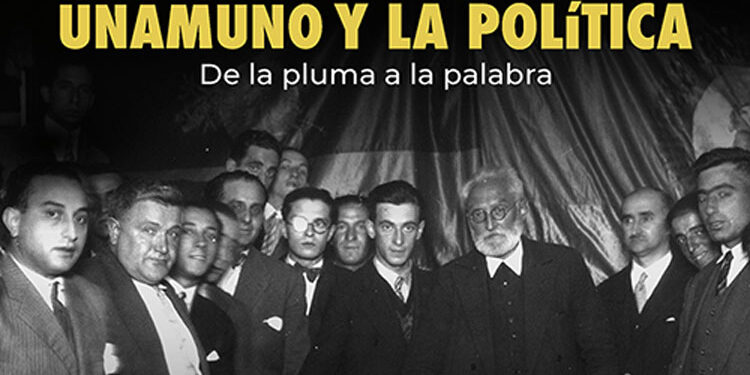The Sala Hipóstila of the Biblioteca Nacional de España (Paseo de Recoletos, 20-23) hosts until next December 8 the exhibition Unamuno and politics. From the pen to the word, in which the indissoluble links that unite Miguel de Unamuno (1864-1936) are analyzed with the history of Spain over more than fifty years from the selection of numerous iconographic and textual documents sometimes forgotten or unpublished (letters, press articles, speeches, conferences…).
The deliberate choice of a chronological approach highlights the coherence of political thought of an intellectual who is reluctant to any kind of dogma but often presented as contradictory and “paradoxes.” That’s what I said.
This exhibition shows the validity of the political thought of Miguel de Unamuno, a committed intellectual who often analyzes and denounces colonialism, censorship, the Throne and Altar alliance, Basque and Catalan nationalism, fascism and communism, violence in public life; it also judges the role of Parliament, The Spanish government has been responsible for the political parties, the press and even relations between Spain and Europe.
Unamuno never became a politician in the literal sense of the word, because he was always willing to avoid being placed in any party. Yet he rose very early as a stirrer of spirits, determined to remedy the ills of his country, even as an actor or guide during the tragic hours that his country lived. He expresses his constant desire to “make public opinion” in his enormous journalistic work scattered in almost 300 magazines and newspapers. On the occasion of the war in Cuba and the Montjuic trials, he imposed himself on the political landscape of Spain for his pacifist and anti-colonial positions.
During his long rectorate (1900-1914), Unamuno acts as “traveling preacher”The Church’s power and its agricultural campaigns against the landowners of the province of Salamanca are causing their dismissal. He also began to oppose the monarchy in the person of Alfonso XIII and the role of the army during the war in Morocco.
During the Great War, Spain’s neutrality fuelled its anti-monarchist stance and was increasingly subject to relentless censorship. His position as a European intellectual is strengthened when he stands up against the barbarity of the German army through the Spanish press, The French and Italian Governments also consolidated their position as tribune. In September 1923, the manifesto of General Primo de Rivera that inaugurated a dictatorship constitutes a new turning point in his life.
Between 1924 and the early 1930s, he stood as the first fierce opponent of the military regime, which he abhorred. From Paris and then Hendaye, Miguel de Unamuno encourages resistance to the dictator by collaborating in clandestine magazines, receiving Spanish anti-monarchist politicians and uses poetry as a weapon of war. It does not hesitate to denounce the fascism of Mussolini’s Italy and its action as a conspirator, The French Government, which has repeatedly wanted to exile him north of the Loire, has made clear its political commitment to the dictatorship and sometimes to the French Government.
In 1931, after his triumphant return to Spain the previous year, he was elected deputy of the young republic, but soon abandoned his seat in the Cortes, disappointed by the different governments, in disagreement with the policy pursued and the “brutalization” of political life.
When the military coup took place, Unamuno, plunged into a whirlwind of violence and confusion, joined the insurgents for a few weeks. But after his momentary support, amplified by the media propaganda of the rebels, he stood firmly and publicly against them during the resounding celebration on October 12, 1936. He confirms this position when he states in his last draft that the “hotros” -the rebels- are worse than the “huns”-the Marxists. He also foreshadows the coming of “a military dictatorship” and writes shortly before his death that “vengeance must be renounced”.






